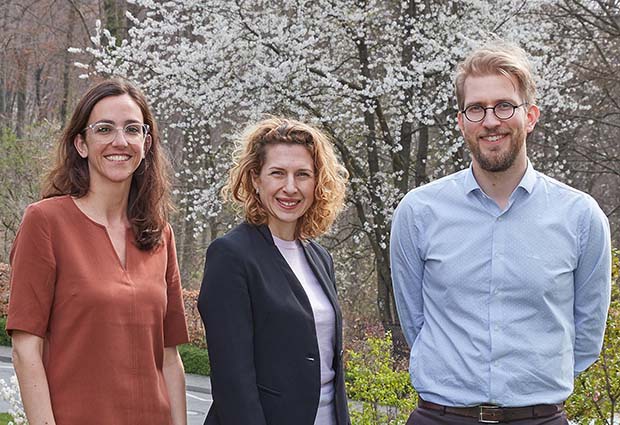
Read the latest Issue
EMBL enjoys continued success in attracting EU funding

In March, EMBL was awarded its 100th EU Horizon 2020 grant: a milestone in its participation in the world’s largest funding programme for research and innovation. EMBL’s success in securing Horizon 2020 funding, via a highly competitive and rigorous application and assessment process, puts it among the top 100 organisations participating in this programme and is a testament to the world-class research carried out here.
Horizon 2020 covers the period 2014–2020, with total funding of almost €80 billion available during this time. Since the programme’s inception it has been an important source of funding for EMBL. In the past five years, EMBL has received over €95 million in Horizon 2020 grant funding: approximately €17–19 million annually.
Scientists at EMBL, including ELIXIR and Euro-BioImaging, are currently participating in 109 Horizon 2020-funded projects, either individually (33), or as coordinators (12) or partners (64) in research consortia.
EU-sourced funding is EMBL’s largest single source of external grant revenue, accounting for approximately 30% of the total annually. Reflecting on EMBL’s success in attracting this funding, Virginia Otón García, Head of Grants Services, cites the quality of the science being conducted here as a key factor. “It’s important to have a good idea, to have a strong group or a strong collaboration as part of a consortium, and to take the time to plan your project correctly,” she says. Her experienced team provides support in going through the application process. “Those scientists who know how to sell the importance of their research – how it will impact and advance their field – are better positioned to be successful. However, this alone is not enough. It’s important to be well prepared and organised, to make time for writing grant applications, and to get feedback from peers and Grants Services. Last-minute applications done in a rush will not be successful.”
In terms of Horizon 2020 funding applications, EMBL scientists participate in different programmes, including European Research Council (ERC) individual research programmes for group leaders, collaborative infrastructures projects (mostly at EMBL-EBI) and health projects, among others. Of the total H2020 funding attracted by EMBL, 44% is obtained through ERC grants and Marie Skłodowska-Curie actions (individual fellowships, training networks, and the EMBL EIPOD programme). However, Otón García is keen to stress that EMBL also receives funding from other sources, including the National Institutes of Health (NIH), national funding agencies in EMBL’s host countries, and other foundations, philanthropic organisations and private donors.
Applying for grant funding, and then managing those grants and fulfilling the monitoring and reporting requirements, can seem like a full-time job in itself, and one that scientists may feel burdened by. It also takes up time that could otherwise be spent doing what they do best: great science in the lab. “The monitoring and reporting load is high, and this can be overwhelming for the scientists,” says Otón García. “In the Grants office, we try to take away the additional burden of paperwork. We provide support in terms of monitoring, reporting, and ensuring deadlines are met. Spending hours writing reports is not the best use of researchers’ time. We have these great minds here at EMBL, and they should be free to focus on advancing science.”
While most senior scientists are likely to have notched up considerable experience in grant applications and figured out their own strategies for success, early-career researchers are often less familiar with the array of opportunities available, and need guidance and support. The Grants Services team at EMBL provides a range of services, including seeking out funding opportunities and matching them with groups doing particular types of research, working with postdocs who are looking for fellowships to fund their salaries, and advising on project implementation. They also coordinate the administration involved in grant management, spanning finance, budgeting, ethics, monitoring, contracts and amendments, and other legal documents involved in research collaborations. This behind-the-scenes activity alleviates the stress on scientists and lays a solid foundation for good grant management.

As one of Europe’s leading research organisations in the life sciences, EMBL has an important role in informing policy development at the EU level. EMBL fosters a close relationship with the European Commission, and is one of very few organisations to have a Memorandum of Understanding with the Commission. On the policy side, EMBL’s relationship with the EU gives us a unique insight into what’s happening in Brussels in terms of policy development and funding for the life sciences. The European Commission is also an observer in the EMBL Council. As Jana Pavlic, Joint Head of Government and EU Relations, explains, “Our Memorandum of Understanding gives us direct contact with the Commission and facilitates an open exchange of opinion and know-how about mutually beneficial projects. Our reputation is such that the Commission will often reach out for input, either for participation in key policy events or for preliminary thoughts on some of the policies. We too turn to the Commission to gain a better understanding of ongoing initiatives and future directions. We see this relationship as very important for the development of the European life sciences in general, which is one of EMBL’s key missions.”
For the past three years, EMBL’s Government and EU Relations team has had a dedicated EU Relations Officer, Max Eklund, who works to establish contacts in Brussels and to forge links with the European Parliament and relevant committees. He has worked with various actors in Brussels to convey the key messages important for EMBL in the negotiation of the next Framework Programme for Research and Innovation – Horizon Europe – which will succeed Horizon 2020. As Eklund explains, position papers, developed in close collaboration with senior scientists at EMBL, are an important basis for reaching out to Brussels. The latest two – one on the mid-term review of Horizon 2020, and another on the future direction of Horizon Europe – were distributed to the Commission, to key actors in the European Parliament and to EMBL member states.
Looking to the future, Pavlic says: “Sharing a joint understanding of where the European life sciences are heading is essential, at a time when new financial frameworks are being negotiated in the EU and are soon to be at EMBL. Therefore we will continue to work closely with the European Commission.”
[All data in this article were extracted from the Horizon 2020 Dashboard in March 2019. The Dashboard is a public portal with data on all Horizon 2020-funded projects and proposals.]
Looking for past print editions of EMBLetc.? Browse our archive, going back 20 years.
EMBLetc. archive